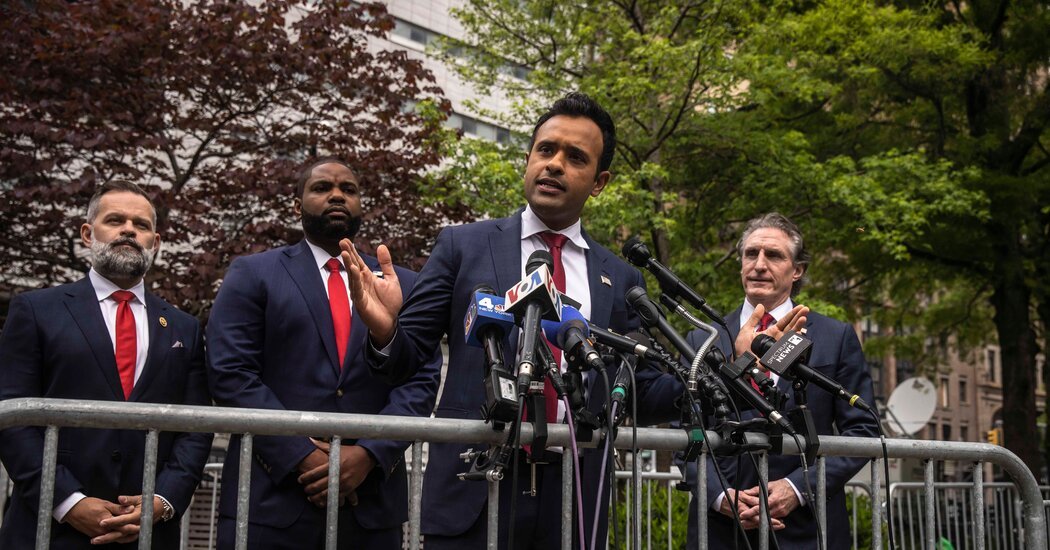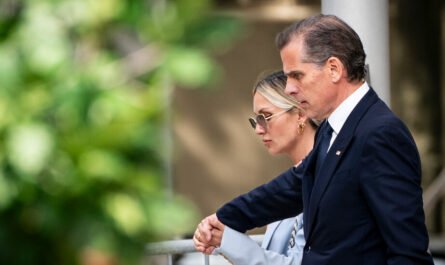There are few distractions in the courtroom while Donald J. Trump’s criminal trial is in session. Lawyers and witnesses talk. Onlookers are tense and silent. And a squadron of armed court officers and Secret Service agents guards the room.
But as Michael D. Cohen explained this week why he had broken with his former boss in 2018, after saying he spent more than a decade doing Mr. Trump’s bidding, reporters turned away from him to stare at one of the trial’s most noticeable interruptions.
A parade of Mr. Trump’s Republican allies — a governor and a former presidential candidate, among others — marched into the courtroom, living examples of the loyalty that Mr. Cohen had just described, and would soon disavow.
Central aspects of Mr. Trump’s operating style are key to the complex story the Manhattan district attorney’s office has told. And those hallmarks are all around the courthouse.
Prosecutors are relying on Mr. Cohen’s testimony, even as Mr. Trump’s lead lawyer, Todd Blanche, took a sledgehammer to the former fixer’s credibility this week, forcing him to acknowledge times in the past when he has lied under oath.
But whether Mr. Trump is convicted, acquitted or the case ends with a hung jury, the trial has underscored the former president’s favored tactics and behavior over the decades — using allies as bullies, obsessing over the press, placing a premium on beauty and encouraging shows of loyalty. That recognizable pattern has helped him win one election and may propel him to a second victory, as he has reshaped the Republican Party into an entity that stands for whatever Mr. Trump wants.
Mr. Trump begins each court day contorting his face into a scowl when cameras come to take his picture, before the jury enters — a visage he has crowed about as looking “tough.”
Most days, Mr. Trump has been joined by Boris Epshteyn, Mr. Trump’s top legal adviser and a controversial figure within the former president’s team. Mr. Epshteyn was previously represented by Mr. Blanche, whom Mr. Epshteyn helped usher into the Trump fold.
Mr. Epshteyn started showing up in court for the first time the day after he was indicted himself, in Arizona. That indictment was in connection with efforts to create a slate of so-called fake electors to help keep Mr. Trump in power after he lost the 2020 election and refused to concede. Mr. Epshteyn was seen in court recently passing to a journalist a printout of a Truth Social post in which Mr. Trump mocked a frequent critic, the lawyer George Conway, who has been in the courtroom covering the case for The Atlantic.
Former female aides have testified to the former president’s deep love of his wife. But even the presence of those aides and current ones who travel with him — well-groomed and well-coiffed — emphasizes the premium Mr. Trump puts on being seen as surrounded by attractive women. Mr. Trump’s interest in being seen as a sought-after playboy was on display for decades before he became president.
That behavior was at the heart of the “Access Hollywood” recording, on which Mr. Trump is heard boasting about grabbing women by their genitals. Prosecutors have argued the recording was part of why Mr. Trump wanted to suppress a story from the porn star Stormy Daniels just before the 2016 election.
And the number of elected officials or former candidates arriving to defend Mr. Trump has been a reflection of his constant demand that people rise up on his behalf and affirm him, voiced privately and on social media.
In the early days of the trial, almost no one showed up with Mr. Trump, despite discussions for weeks within his world about who might fill the two rows behind the defense table that are reserved for the defendant’s lawyers, support staff and family.
But Mr. Trump complained to several people that he wanted to see more allies in the courtroom, and the word spread among elected officials who have long seen how Mr. Trump prizes loyalty. Senator Rick Scott, Republican of Florida, showed up in the courtroom one day, a beacon of sorts for the ranks of politicians who would soon appear. There were House members, state attorneys general and a governor last week, all filling seats reserved for the defense.
There were also two contenders to be Mr. Trump’s running mate, Vivek Ramaswamy and J.D. Vance. Their presence showed they were backing a presumptive nominee who has repeatedly complained that his previous vice president, Mike Pence, was insufficiently tough in the final days of Mr. Trump’s term.
Even the House speaker, a staunch conservative who has in the past voiced an aversion to pornography, arrived outside the courthouse to defend the former president less than a week after the porn star left the stand.
Inside the building, Mr. Trump’s entourage has stretched the bounds of what courthouse rules allow. Some of his allies take advantage of exceptions granted to lawyers and support staff by sitting in the defense rows, using cellphones that are banned elsewhere in the courtroom to send texts or post on social media about the proceedings.
Photography and video-recording are strictly prohibited inside state courtrooms. Still, the fact that news cameras have been in the courthouse hallway — as has been done for other high-profile defendants — has allowed Mr. Trump to speak to the press, and created an opportunity for his allies to create content on his behalf.
“Standing back and standing by, Mr. President,” Representative Matt Gaetz of Florida posted on X on Thursday, above a picture of himself standing behind Mr. Trump while the former president talked in the hallway. Those words echoed Mr. Trump’s own back in 2020, when he gave a message to the far-right extremist group the Proud Boys during a debate with President Biden.
On Tuesday, some of the same allies who interrupted Mr. Cohen’s testimony filmed a video of themselves in the holding room the defense uses, again testing the bounds of what is permitted. Mr. Trump’s son Eric, his daughter-in-law, Lara, his former rival Mr. Ramaswamy and two House members filmed a video titled “Breaking Video From the Courthouse.”
“We need you to stand with him,” Representative Byron Donalds of Florida said in the video, which was sent around in a Trump fund-raising email.
On Thursday, after prosecutors mentioned the interruption during Mr. Cohen’s testimony two days earlier, Justice Juan M. Merchan advised Mr. Blanche not to let it happen again. The defense lawyer protested, saying he had “less than zero control over what is happening.” And when Justice Merchan asked him if he was expecting anybody else that day, Mr. Blanche pleaded ignorance.
“Your Honor, I have no idea,” he said, adding, “No, I’m not expecting anybody else. But I might be wrong.”
He hardly needed anybody else. Mr. Trump’s entourage that day included 11 members of Congress, as well as Mr. Epshteyn and Eric Trump. The group had already taken their seats behind the defense table, waiting to see Mr. Cohen cross-examined.



